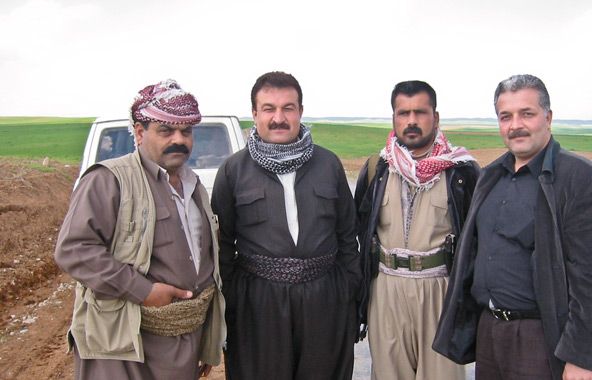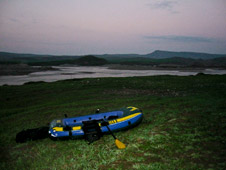
12 March, 2003, Iraq. It was dark and cold out there and I thought it would have been more interesting to be a human shield in Baghdad.
Photo: Phillip Robertson
Jean-Paul Sartre, the French existentialist philosopher, wrote plays that emitted the same feeling as the embassy waiting room, a dreadful machine whose moving parts were human.
After we had filled out our forms, Safah reappeared and said that he would contact us. This was our cue to leave. Since I didn't have the telephone number for my hotel, only the name, I said that they might have a hard time finding me. "Just tell us the name, we can find all that out," he said. I left certain that they would do some digging, perhaps do the obvious search on the Internet. The next morning, as I was drinking bitter coffee in the Hotel Sultan, Safah called and said the visa had fallen through. He said he was sorry.
The Iraqi visa scam was the last legal approach I had for traveling to Kurdistan. With war seeming more imminent by the day, all the surrounding countries were closed. Stealing the ferry or finding a boat were the only plans I could come up with that made sense. I chose the boat. The ferry was too close to the police.
The day before I left for Damascus and the Iraqi embassy, I drove around northeastern Syria with an odd man named Abu Baasir. He is the Qamishli town gombeen, the man everybody knows and no one takes seriously. Abu Baasir speaks English passably well, probably from his old days as a Syrian mukhabarat agent, but since it is nearly impossible to hire a translator in Syria, I was stuck with him. I met many people who spoke English well, but no one would take the job, and it took a few days for me to realize that this was another manifestation of the police state -- the secret police must authorize a translator, the state must give its blessing. Anything else is suspect.
Another point in Abu Baasir's favor is that he was always hanging around in front of the hotel, talking to the kids who waited for shoeshine jobs. Abu Baasir had time on his hands. A marginal man, his career had spun out long ago and he now lived with his mother.
I had run into him on the street one day when he tried to sell me a car ride to the ruins at Ain Diwar. I told him that it was important that he get me to a nearby town called Sheikh Amad, where I suspected somebody might have a boat for crossing the Tigris. What do you want to do there? he wanted to know. I want to go fishing in a boat, Abu Baasir, that's what I want to do, I explained. We had trouble finding the place. Abu Baasir reclined in the back seat, his hair slicked back and a gold charm around his neck. It had a small section of the Koran inscribed on its face.
On the map, Sheikh Amad sits next to an inviting lake, a blue oblong that cries out for fishing. So why not drive down to Sheikh Amad and search for boats? We drove all day, while Abu Baasir gave me his philosophy on life, a clutch of random observations. "Gentleman, let me tell you one thing, and that is that the mukhabarat in Syria know everything," he returned to the theme of the secret police.
I tell him that there is no way they can know everything that people do. It's just not possible. "Yes, in Syria they do, gentleman. I know this for a fact." Abu Baasir croaked out more advice from the back seat of the cab, his stream of weird Syrian facts. Wheat fields rolled past the windows. The land was flat, broken only by isolated hills topped by graves. Our cab got its wheels stuck in the rich mud near a madrassa town built by Saudi money at Tal Maruf. A mob of religious students told us to turn the car around and leave the village.
We drove past two identical houses under construction for the local mullah. The mullah's houses were the tallest structures around for miles, including the mosque. Abu Baasir said that the rich mullah of Tal Maruf was lucky to enjoy two paradises, an earthly paradise in his grand houses and a second in the afterlife.
When we arrived at Sheikh Amad, a Bedouin farmer told us that the lake was missing. It had evaporated. Worse, there were never any boats at all. The Bedouin walked over and brought us soft flat bread before we drive away, which we put on the arm rests of the cab so it would spread out in the sun. From Sheikh Amad we drove another few hours to Malkiye, a town close to the Tigris. We were looking for a boat in a cultivated desert, and finding one in this corner of Syria was impossible, a fool's errand. Syrians, both Christians and Kurds, were either suspicious or didn't know the answer, and the local authorities were becoming interested in the foreigner who didn't have the good sense to relocate. Boats are forbidden on the Tigris between Turkey and Syria, so even mentioning the smuggling plot was dangerous. A few days earlier, a Baath Party lady told me to leave town, saying there was no reason for me to stay. "There is nothing for you here. Why don't you go back to Damascus," she suggested.
In Malkiye, a small town near the river, we found an old Christian man who liked to fish, and I finally came clean with him and said I needed to buy a boat to smuggle myself across to Kurdistan. We were surrounded by locals and I hated having to say it in public. It was a mistake. When the men heard the plan, they burst into laughter, and they laughed for a long time. One man danced around the small storefront with an make-believe oar as a joke. The old man said I could use a toy raft if it meant that much to me. The men laughed even harder.
 LEAD IMAGE: 12 March, 2003, Iraq. I crossed the Tigris river from Syria to Iraq in an inflatable boat. It was cold night and I was slightly worried about drifting downstream into Saddam-controlled territory. Once across the river it seemed wise to wait for dawn to break before moving around. Shortly after these pictures were taken, a man in dump truck gave me a ride to Dohuk, Kurdistan.
LEAD IMAGE: 12 March, 2003, Iraq. I crossed the Tigris river from Syria to Iraq in an inflatable boat. It was cold night and I was slightly worried about drifting downstream into Saddam-controlled territory. Once across the river it seemed wise to wait for dawn to break before moving around. Shortly after these pictures were taken, a man in dump truck gave me a ride to Dohuk, Kurdistan.Photo: Phillip Robertson
© Phillip Robertson, 2009-2014.
